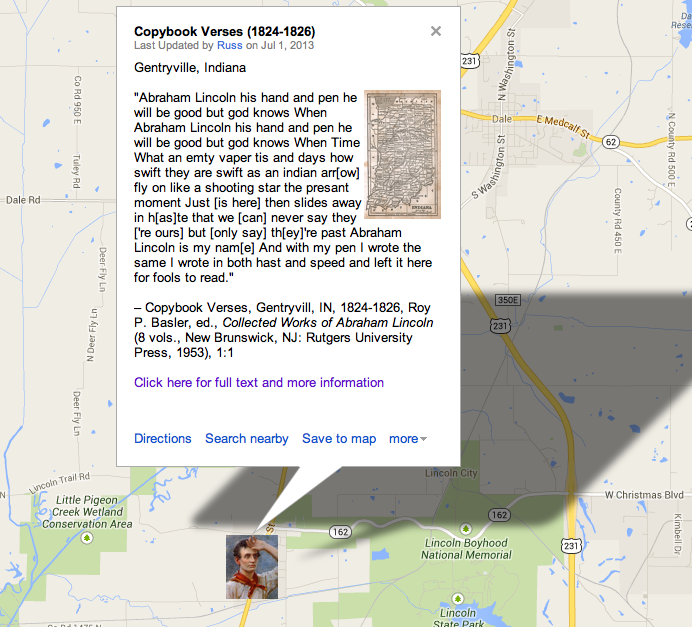Contributing editors for this page include Mike Capps
Ranking
#52 on the list of 150 Most Teachable Lincoln Documents
Annotated Transcript
Close Readings
Mike Capps, “Understanding Lincoln” blog post (via Storify), 2016
Custom Map
How Historians Interpret
“The eleven leaves from Lincoln’s cyphering book deserve a special place in history. They represent the earliest examples remaining of his handwriting, and reflect the effort he put into filling the pages with appropriate rules, problems, and solutions. This was his book, created “by his hand and pen.” These leaves came from the formative years of his life, years that would prepare him in remarkable ways for what lay ahead. Understanding something of the structure and content of his early cyphering work gives us a small but powerful glimpse of the character, commitment, and thirst for knowledge of a lad from Indiana named Abraham. He would be good.”
— McKenzie A. Clements and Nerida F. Ellerton, “Abraham Lincoln’s Cyphering Book and the Abbaco Tradition,” Journal of the Abraham Lincoln Association 36, no. 1 (2015): 1-17.
“This may have been a Lincoln family tradition. In a dictionary kept by the family of Lincoln’s uncle Mordecai there appears the following inscription: “Mordecai Lincoln his hand and pen he Will be good, but you know when. When he is good then you may say The time is come and will hurray this was Wrote by Mordecai Lincoln in the twenty third year of his adge in the year of our Lord one thousand seven hundred and ninety three in the second year of the Common Wealth.”
— Michael Burlingame, Abraham Lincoln: A Life, Volume 1 (Baltimore: The Johns Hopkins University Press, 2008), 28.
“His last school, probably the one that he attended longest of the five to which he was exposed, was taught by Azel W. Dorsey, the treasurer of Spencer County and a sometimes storekeeper. It met in the same cabin that Crawford has used, and Abe’s attendance was more regular than it had been with Swaney. Dennis Hanks insisted that he had given Abe much of his early instruction in reading, spelling, and writing, but since Dennis was barely literate, his claim must be suspect. Abe became proud of his penmanship, often writing letters for other members of the family and for some of the neighbors. The earliest known specimen of his script was a piece of doggerel that he penned in a copybook. “Abraham Lincoln, his hand and pen,/ he will be good but God knows when.” He was at the school long enough to develop close relationships with other students, and he began to emerge as a leader among them.”
– Lowell H. Harrison, Lincoln of Kentucky (Lexington: The University Press of Kentucky, 2000).
NOTE TO READERS
This page is under construction and will be developed further by students in the new “Understanding Lincoln” online course sponsored by the House Divided Project at Dickinson College and the Gilder Lehrman Institute of American History. To find out more about the course and to see some of our videotaped class sessions, including virtual field trips to Ford’s Theatre and Gettysburg, please visit our Livestream page at http://new.livestream.com/gilderlehrman/lincoln

